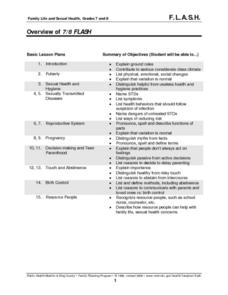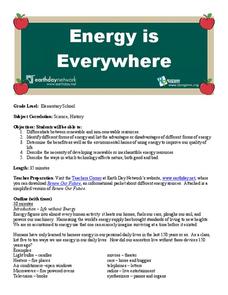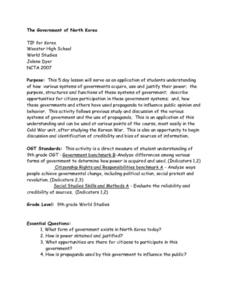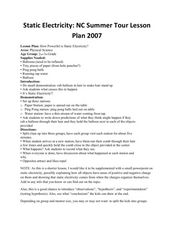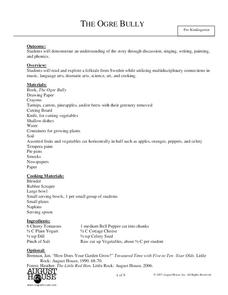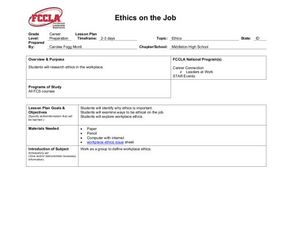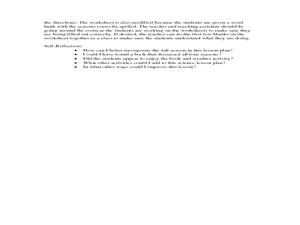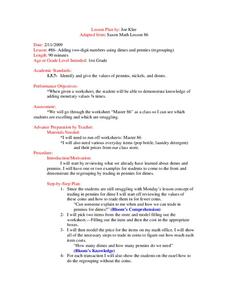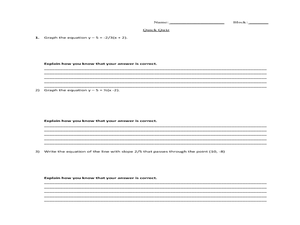Curated OER
FLASH
Young scholars Distinguish among assertive, aggressive, passive and manipulative behaviors,Describe consequences of each,Formulate an assertive request,Describe how it feels to risk rejection. Students Describe how human immunodeficiency...
Curated OER
Energy is Everywhere
Students differentiate between renewable and non-renewable resources and identify the different forms of energy and list the advantages or disadvantages of different forms of energy. They also determine the benefits as well as the...
Curated OER
The Government of North Korea
Ninth graders study the Government of North Korea. They identify the system of government of North Korea today and explain how power is acquired, used and justified by it. They describe the use of propaganda by this government system...
Curated OER
Choices Make A Difference
Learners are explained that wastewater treatment plants are regulated as to the quality of water they may discharge into our rivers and canals. They are explained that wastewater treatment plants clean many pollutants out of the...
Curated OER
How Powerful is Static Electricity?
Students break up into groups to complete a demonstration rubbing a balloon in hair make their hair stand up. Thus, they conclude static electricity. They also experiment with a paper station, ping pong station and a water station...
Curated OER
NUMB3RS Activity: Regular Ploygon Centroids
Students investigate geo-profiling. In this secondary mathematics activity, students use geo-profiling to determine the most probable location of a criminal. Students find the centroid of a polygon where the vertices represent crime...
Curated OER
Anatomy Review
In this biology worksheet, students examine the internal functions of the human body while considering the factors needed to explain the physiological reactions.
Curated OER
Gas Transport
In this biology worksheet, students examine the transport of gases in the circulatory system and how they bond to hemoglobin.
Curated OER
Traditional Marxist Perspectives on Crime
In this Marxist Perspectives on Crime worksheet, students read five pages and then proceed to complete several exercises such as supporting and rejecting a thesis, completing sentences, and categorizing statements.
Curated OER
Sub-Cultural Theories Continued: Delinquency as the Consequence of Normal Working
In this delinquency worksheet, students read and complete ten different exercises, including providing examples of theories, matching ideas to theorists, writing about their opinions, and comprehension questions about the article.
Curated OER
Alligators
Students investigate the characteristics of alligators. In this animal science lesson, students sing a song to identify the parts of an alligator. Students draw a picture of their own alligator.
Curated OER
Exploring the Dark Heart of an Obsessive Mind
Students complete a unit of activities for "The Tell-Tale Heart" by Edgar Allan Poe in part to analyze short stories, playwriting, and video production. In this Edgar Allan Poe lesson, students complete a 37 page packet of activities...
Curated OER
The Ogre Bully
Students listen to the book, The Ogre Bully, and discuss the problems the farmer and his family had during the story. In this garden themed lesson, students examine different fruit and vegetables and plant them in soil to grow. ...
Curated OER
Ethics on the Job
Students examine ethics in the workplace. In this Career and leadership lesson, students will pair up to discuss various issues surrounding workplace ethics. This lesson includes 3 different activities, and assessment and necessary...
Curated OER
Weather with Pink Snow and Other Weird Weather
Third graders explore different kinds of weather. In this weather lesson, 3rd graders discover the different ways humans protect themselves from weather. Students read the book Pink Snow and Other Weird Weather by Jennifer Dussling....
Curated OER
Adding Two-Digit Numbers Using Dimes and Pennies
First graders examine regrouping when adding, by using dimes and pennies to borrow. In this addition lesson plan, 1st graders work together as a whole group, working together with the teacher.
Curated OER
Earth's Rotation
Fourth graders investigate the Earth's rotation. In this Earth's rotation lesson, 4th graders realize that the rotation of Earth causes the days and nights on Earth. Students break into groups and use a flashlight and a sphere to...
Curated OER
Slope, slope-Intercept Form and Standard Form
Students investigate and solve linear equations using slopes. In this algebra lesson, students graph lines using the slope and y intercept. They also find the slope by rewriting their equation in to slope-intercept form from standard form.
Curated OER
Community
Second graders draw a picture. In this communities lesson, 2nd graders read the book Communities, and review as they read. Students use construction paper to create a picture of their houses in three different communities including...
Curated OER
Music-Follow the Drinking Gourd
Fourth graders study the song "Follow the Drinking Gourd." In this dance lesson, 4th graders listen to the book by the same name, listen to the music, and in small groups create a short dance illustrating a stanza from the song.
Curated OER
Function of a Stem
Fourth graders perform an experiment to test the function of a stem. In this science activity, 4th graders write a description of their investigations. Students also explain how the stem interacts with the rest of the plant. Students use...
Curated OER
Polygon Perimeters
Fourth graders practice finding the perimeter of shapes. In this measurement lesson, 4th graders review the meaning of perimeter and work in groups to draw polygons with differing perimeters. Students share their polygons with the class.
Curated OER
The Pan-American Exposition of 1901
Students examine the impact of the 1901 World's Fair. In this lesson on invention and politics, students watch a video then conduct Internet research in order to learn about the Pan American Exposition. Students will create a brochure...
Curated OER
Sense of Taste
Students swab different sections of the tongue to identify taste buds. In this sense of taste instructional activity, students make predictions and conduct an experiment. Students experiment with a variety of flavors and discuss results...


